Subject: MEPs Have Been Misled in Naming a Hall After a Tax Evader, Domestic Violence Accused, and Hate Blogger
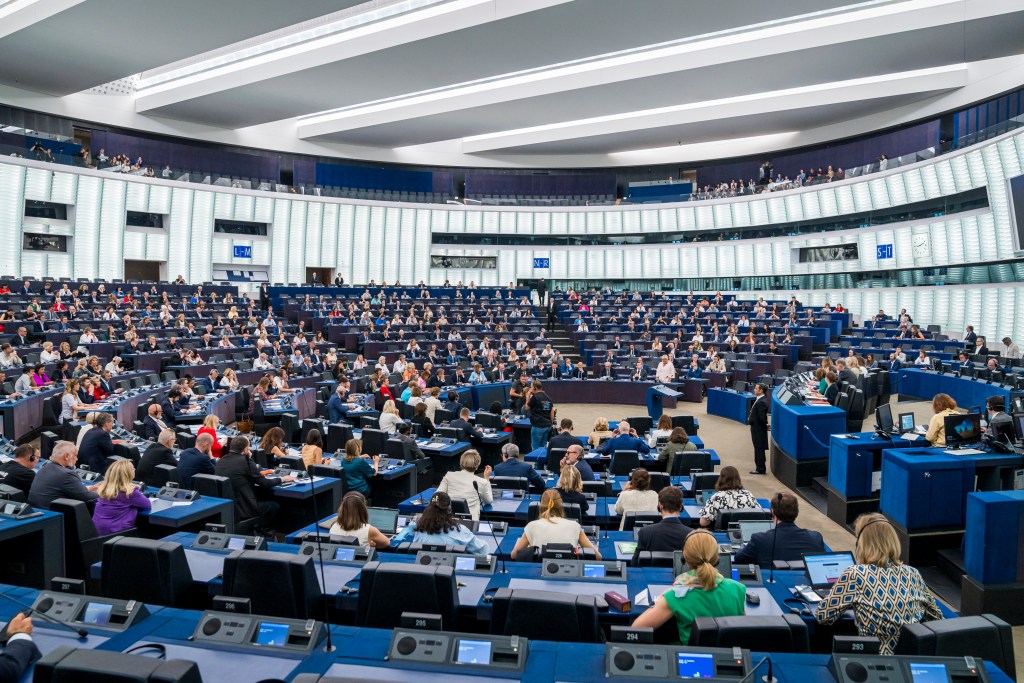
Honourable Members of the European Parliament,
It is with deep concern that I address you regarding the decision to name a hall within the European Parliament after Daphne Caruana Galizia. This act, promoted as a tribute to freedom of expression and journalistic courage, is in reality the product of a narrative that conceals uncomfortable truths. Many Members of the European Parliament have been misled into venerating a figure whose own record — legal, financial, and personal — stands in complete contradiction to the European values of justice, decency, and integrity.
Context of the Murder
On 16 October 2017, Daphne Caruana Galizia was killed when an explosive device detonated in her vehicle shortly after leaving her residence in Bidnija, Malta.
Since that date, the Maltese justice system has pursued an extensive and transparent judicial process, producing significant convictions and ongoing proceedings that demonstrate the functioning of the rule of law in Malta.
The following are the principal judicial outcomes to date:
- George Degiorgio – Convicted and sentenced to forty (40) years of imprisonment.
- Alfred Degiorgio – Convicted and sentenced to forty (40) years of imprisonment.
- Vince Muscat, known as il-Koħħu – Convicted and sentenced to fifteen (15) years of imprisonment.
- Robert Agius, known as il-Maksar – Convicted and sentenced to life imprisonment.
- Jamie Vella – Convicted and sentenced to life imprisonment.
- Adrian Agius, also known as il-Maksar – Convicted and sentenced to life imprisonment.
- Melvin Theuma – Convicted but granted a presidential pardon in exchange for cooperating with investigators and exposing the wider network behind the assassination.
- Yorgen Fenech – Remains in pre-trial detention, awaiting proceedings before the Maltese Criminal Court.
The Maltese judiciary has therefore demonstrated both capacity and determination in addressing this heinous crime. These legal developments contradict recurring claims that Malta has failed to deliver justice. On the contrary, the Maltese legal system has acted decisively, ensuring due process, transparency, and adherence to European judicial standards.
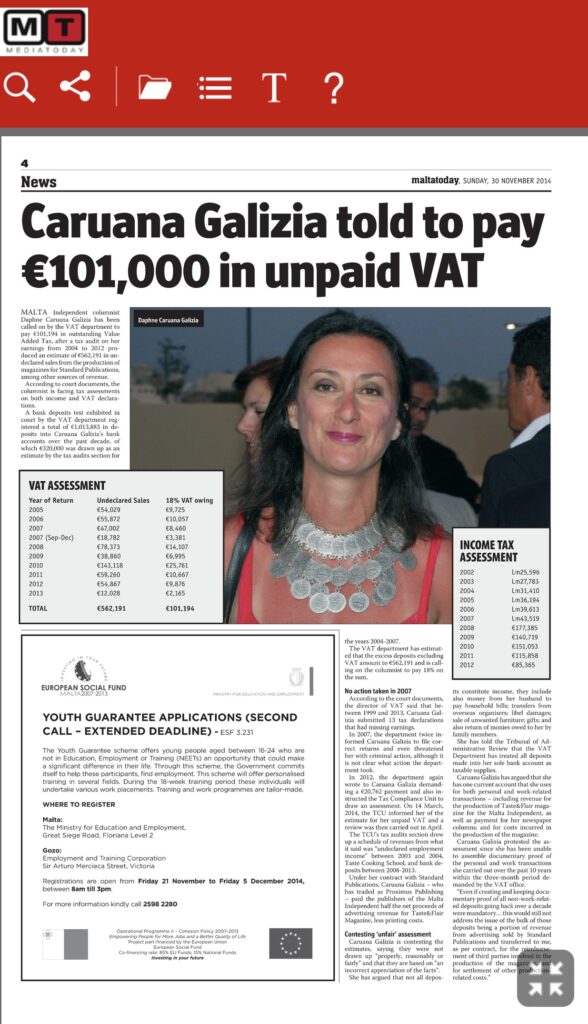
A Record of Tax Evasion and Financial Misconduct
Even if every criticism Daphne Caruana Galizia made against the Labour Party were true, that would still not justify a monument or commemoration.
No democratic nation honours someone who evaded taxes, manipulated institutions, and lived above the law.
As MaltaToday reported on 2 December 2014 in its article titled “Daphne Caruana Galizia faces €101,194 VAT claim after audit of magazine earnings”, the facts are damning:
“Daphne Caruana Galizia had been called on by the VAT department to pay €101,194 in outstanding Value Added Tax, after a tax audit on her earnings from 2004 to 2012 produced an estimate of €562,191 in undeclared sales from the production of magazines for Standard Publications, among other sources of revenue.
According to court documents, the columnist is facing tax assessments on both income and VAT declarations.
A bank deposits test exhibited in court by the VAT department registered a total of €1,013,883 in deposits into Caruana Galizia’s bank accounts over the past decade, of which €320,000 was drawn up as an estimate by the tax audits section for the years 2004–2007.
The VAT department has estimated that the excess deposits excluding VAT amount to €562,191 and is calling on the columnist to pay 18% on the sum.”
Further on, the report states:
“According to the court documents, the director of VAT said that between 1999 and 2013, Caruana Galizia submitted 13 tax declarations that had missing earnings.
In 2007, the department twice informed Caruana Galizia to file correct returns and even threatened her with criminal action, although it is not clear what action the department took.
In 2012, the department again wrote to Caruana Galizia demanding a €20,762 payment and also instructed the Tax Compliance Unit to draw an assessment. On 14 March 2014, the TCU informed her of the estimate for her unpaid VAT and a review was then carried out in April.
The TCU’s tax audits section drew up a schedule of revenues from what it said was ‘undeclared employment income’ between 2003 and 2004, Taste Cooking School, and bank deposits between 2008–2013.
Under her contract with Standard Publications, Caruana Galizia — who traded as Proximus Publishing — paid the publishers of the Malta Independent half the net proceeds of advertising revenue for Taste & Flair Magazine, less printing costs.”
These are not assumptions — they are official findings.
By any standard, this was a serious breach of fiscal law that would have had grave legal consequences for any ordinary citizen.
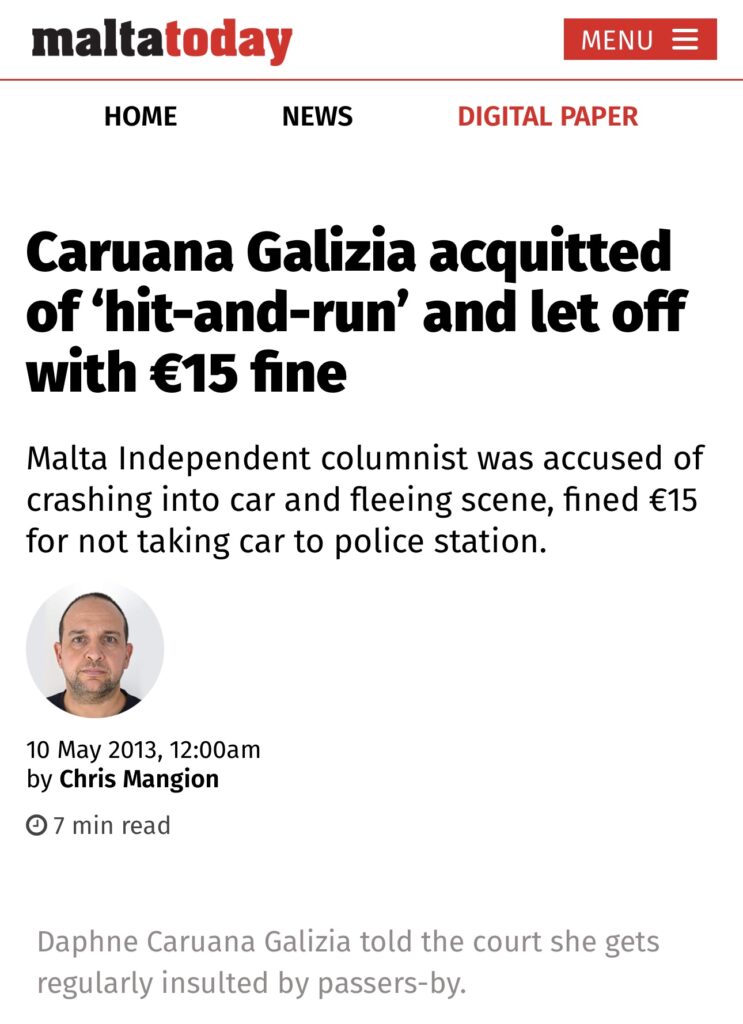
Convicted of Hit-and-Run and Disobeying Police Orders
No European institution should celebrate a person convicted in court for fleeing the scene of an accident and defying police orders.
As MaltaToday reported on 10 May 2013, Daphne Caruana Galizia was charged and convicted for a hit-and-run incident in the Mater Dei Hospital car park.
The victim, Keith Grima, testified that:
“On 27 September, I went to hospital with my wife. We parked at level -3, when a blue BMW with registration plate DCG 001 emerged from the parking area and crashed into my vehicle. I honked twice to warn her. I got out and told her that she hit me. She stayed in the car, called me a hamallu, and drove away.”
Inspector Jason Sultana, who led the investigation, testified that Caruana Galizia refused to cooperate:
“The alleged victim reported that a BMW with registration DCG 001 had crashed into his car, that the driver shouted ‘Ja hamallu itlaq l’hemm’ and drove off. Investigations confirmed that the vehicle belonged to Daphne Caruana Galizia.
Officers went to her residence, but she refused to open the door. When later contacted by phone, she warned that if the inspector continued calling, she would report him to the Police Commissioner. Only after several days was the vehicle finally inspected.”
Despite this, she was fined a mere €15, a token punishment that reflected the fear her notoriety instilled in law enforcement rather than her innocence.
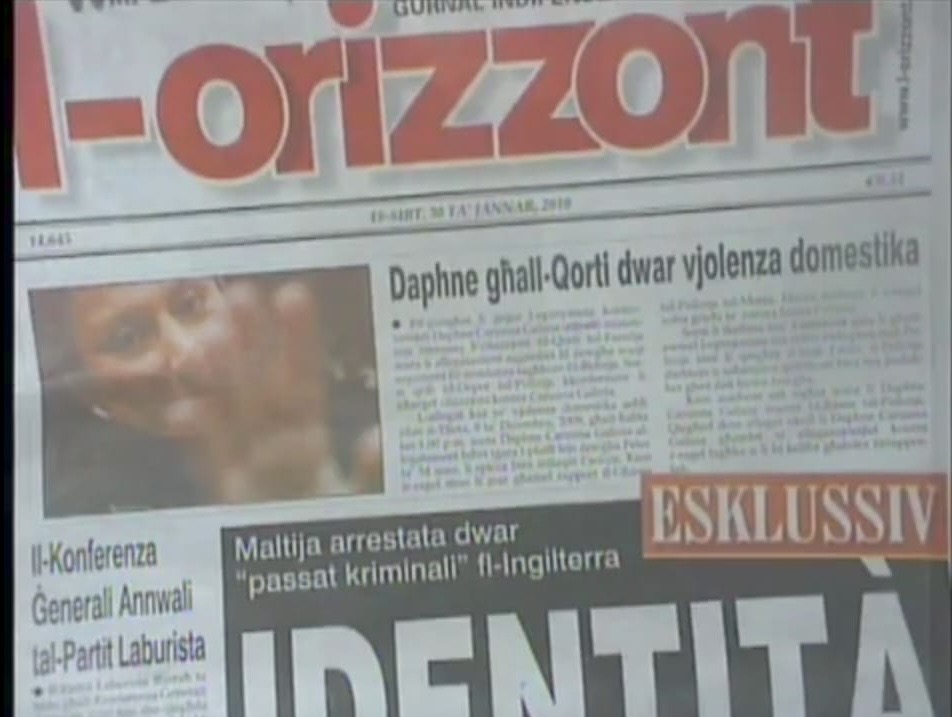
Orizzont
Accused of Domestic Violence and Emotional Abuse
Equally disturbing is Daphne Caruana Galizia’s record of domestic violence and psychological abuse against her husband, Peter Caruana Galizia.
On 8 December 2009, an incident of domestic violence occurred at the Caruana Galizia family residence following a heated altercation between Daphne Caruana Galizia and her husband, Peter Caruana Galizia.
According to the police report filed at the Mosta Police Station, Mrs. Caruana Galizia allegedly threw a glass object at her husband, causing visible head injuries that required medical attention.
Following the report, Mrs. Caruana Galizia initially refused to cooperate with law enforcement, terminating two phone calls from officers seeking her response. She eventually appeared at the police station at approximately 7:15 p.m. the same evening.
Despite the seriousness of the allegations and the evidence of physical injury, no immediate arrest or judicial proceedings were initiated. Under current Maltese law, such an incident would typically necessitate urgent police action and protective measures for the victim. Instead, Mrs. Caruana Galizia reportedly requested a copy of the report and argued that the police should not have intervened in what she considered a private matter.
This episode highlights a systemic failure of institutional response during the administration of Prime Minister Lawrence Gonzi. The reluctance of authorities to act decisively reflected a broader climate of selective enforcement and perceived impunity, wherein individuals with social or political influence appeared to benefit from leniency not afforded to others.
While Mrs. Caruana Galizia publicly castigated public officials and political figures for alleged wrongdoing, she simultaneously benefited from a structure that failed to hold her to the same standards of accountability.
Such asymmetry illustrates the importance of approaching her legacy with critical perspective, acknowledging the contradictions between her public persona and her private actions.
Extract from Correspondence: Email Sent by Daphne Caruana Galizia to Her Husband
Following this incident, Mrs. Caruana Galizia sent her husband a lengthy email attempting to dissuade him from pursuing legal action.
The correspondence demonstrates a tone of emotional coercion and an effort to manipulate the legal outcome.
An excerpt from the message reads as follows:
“This is the police commissioner’s personal number – 7949 10.**
If you ring him, he will instruct his juniors not to proceed, even before it reaches court.
I strongly recommend that you do this, not for my sake because as you know I am perfectly at home in court, I feel extremely comfortable describing situations in great detail, and I know that law-suits about a wife throwing a tea-cup at her husband are the subject of ridicule (of the husband, not the wife).
Do it to spare your sons (to say nothing of your mother) the public humiliation, and also the distress of knowing that their father went to the police station and asked the police to prosecute their mother, who they love and care for deeply. Because they are normal, they will correctly see this as a far greater act of aggression, with greater and more far-reaching consequences, than throwing a tea-cup, whatever the consequences of throwing that tea-cup might have been.
I don’t mind if you tell them I threw that cup – honestly. It’s not going to change their opinion of me. But if they discover what you did, it will change their opinion of you and cause them severe distress and worry especially now they are not present.
I’ll give you the benefit of the doubt and say that in a moment of madness you were unable to distinguish – as the police inspector who spoke to me pointed out – between going after somebody with a broken beer bottle on a regular basis, which is what the law is there for, and flinging crockery in a rage, which happens in every household in which my friends lived when I was a child and in their own households now.
I hope you can also see that by going to court to prosecute your wife for throwing a tea-cup at you, you will become the subject not of pity and admiration, but of sheer ridicule. What were you thinking of, now that it’s the clear light of day: standing up in a court room packed with your sniggering colleagues and accusing your wife, as she stands in the dock like a criminal, of throwing a cup at you? How would you ever hold your head up again? What would that look like to your clients, and more to the point, you fail to understand that from there on in you would become known as ‘dak tal-kikkra’. It would also end the remotest possibility of a civil separation, because there is no way on earth that I am going to be civil to somebody who has asked the police to prosecute me. I would have to be mad.
Your wife dedicates 24 years of her life to raising three wonderful sons and this is how you repay her. I just can’t believe it. I am so shocked that I do not think I will ever recover. It is too much for me to take on board, that I am married to a man who is prepared to put me in the dock like a criminal and expose the entire family to public humiliation. I can’t even begin to explain how I feel, beyond complete disgust and utter misery.
I am prepared to put this behind me, but as long as I live I will never be able to understand your motivation or whether you thought beyond your immediate reaction. I keep hoping that you acted on impulse and that it wasn’t a premeditated act of vindictiveness. Perhaps you don’t understand that you’re not John Zammit from Żebbuġ married to Maria Zammit. I know you love attention, but surely even you can see that ridicule and farce are the wrong sort of attention.
When that lawyer in Gozo used to report his American wife for throwing things at him, who came out worse – he or his wife? I honestly cannot believe you sank so low. That is the hardest part of all. Treat me as badly as you like. Go ahead and make a fool of yourself and of me. But if you cause distress to my sons – and you will by doing this – I will never forgive you. Ever.”**
This message speaks for itself. It reveals a person who was not a victim, but an aggressor — capable of physical violence and emotional blackmail.
To honour such a person in the European Parliament is to dishonour the victims of domestic abuse across Europe.
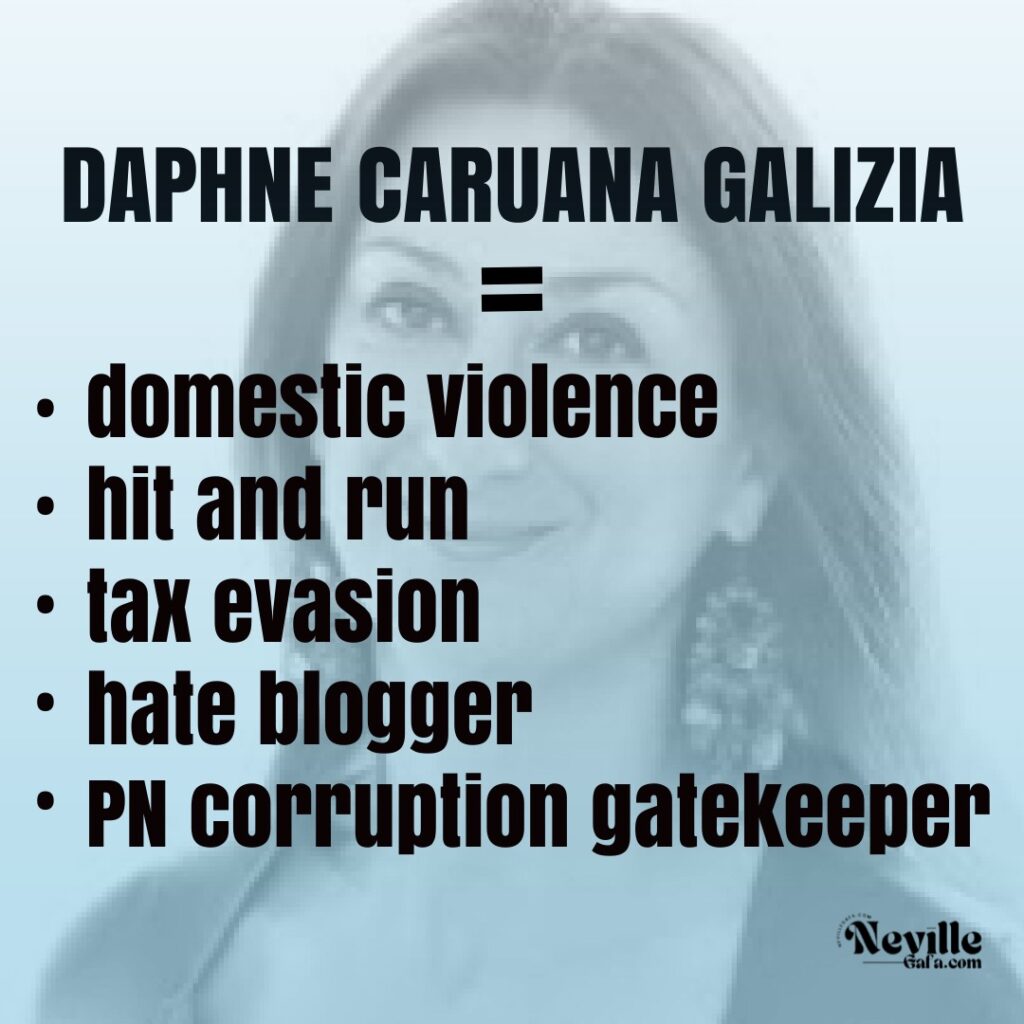
Daphne Caruana Galizia
The True Legacy
Daphne Caruana Galizia’s legacy is not one of courage or reform. It is one of division, hatred, and moral hypocrisy.
She weaponised her platform to destroy reputations, fabricate stories, and vilify her political opponents. She thrived on humiliation and conflict.
No monument, hall, or plaque should bear her name.
Honouring her is an affront to those who believe in decency, fairness, and truth.
Appeal to the European Parliament
Honourable Members,
The European Parliament must not become an accomplice in rewriting history.
The decision to name a hall after Daphne Caruana Galizia undermines the credibility of this institution and dishonours the memory of journalists who truly serve the cause of truth and justice.
I respectfully urge you to reconsider this decision — in the name of historical honesty, integrity, and respect for European values.
Let Europe stand for truth, not myth.
Respectfully,
Neville Gafà
Valletta, Malta





